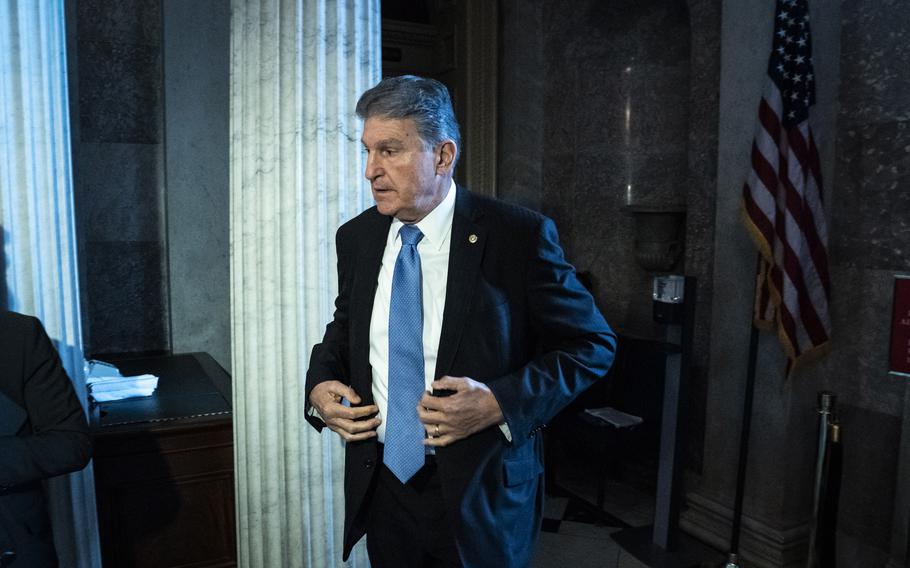
Sen. Joe Manchin III, D-W.Va., walks to a meeting on Capitol Hill on Thursday, Dec. 9, 2021, in Washington, D.C. (Jabin Botsford/The Washington Post)
WASHINGTON — A decisive week awaits Senate Democrats as they return to Washington on Monday and attempt to resolve a slew of long-simmering differences around a $2 trillion package to overhaul the nation's health care, education, climate, immigration and tax laws.
With only 12 days until Christmas — the date by which Senate Majority Leader Charles Schumer, D-N.Y., has said he hopes to adopt the bill — Democratic lawmakers still appear at odds among themselves over the size and scope of their sprawling spending proposal.
The chief obstacle is still Sen. Joe Manchin III, D-W. Va., a pivotal moderate swing vote who has only intensified his criticisms of the proposal in recent days. Manchin repeatedly has refused to endorse the measure, known as the Build Back Better Act, and he has reiterated his calls for Democrats to slow down their work, particularly in response to his concerns around inflation.
In a sign that the tense talks are entering a new, more serious phase, Manchin is set to meet early this week with President Joe Biden to discuss the path forward, the White House announced last week. That meeting could occur as soon as Monday, according to two people familiar with the matter who requested anonymity to describe the plans, cautioning it could change.
The meeting marks Biden's latest attempt to engage Capitol Hill directly and save the final component of his economic agenda from further disputes and delays. The task is all the more critical in the Senate, since Democrats in the narrowly divided chamber simply cannot adopt their roughly $2 trillion measure without Manchin's supportive vote.
Spokespeople for the White House and Manchin each declined to comment.
In the meantime, Senate Democrats are set to forge ahead this week with the intricate process known as reconciliation, which will allow the party and its razor-thin majority to band together and adopt the bill despite overwhelming opposition from Republicans.
Democrats over the weekend released another round of legislative text and official budgetary modeling, further refining the bill that party lawmakers adopted in the House last month. On Saturday, they debuted a new version of the proposal that helps pay for the roughly $2 trillion spending measure, a series of financing mechanisms that target millionaires and corporations that pay nothing in taxes.
But the text, released by the Senate Finance Committee, also highlighted the considerable work lawmakers must still do if they hope to bring the bill to the floor before the holiday. One of the most contentious issues — state and local tax relief targeting Americans in higher-cost communities — still has not been resolved. Democrats essentially left the section blank, as they continue to war over the future of that reduction, which some liberals see as too generous for the wealthy.
As they prepare to release more legislative text this week, Democrats also must work out the finer points of their proposal with the Senate parliamentarian. The reconciliation process carries strict rules in the Senate, requiring lawmakers to ensure every element of their plan has direct effects on the federal budget. If it does not, Republicans then can try to strike entire sections from the bill once it reaches the Senate floor.
For now, the two parties are set to battle it out in another round of private meetings in front of the Senate's chief rule-keeper. The process already has imperiled some of Democrats' initial policy ambitions, including their hopes to proffer reforms to the country's immigration laws as part of the social spending bill.
Manchin, however, represents Democrats' greatest political challenge. The moderate lawmaker repeatedly has said he cannot wager a view on the bill until he sees its final text, frustrating many in his party, who say they have whittled down their package considerably to win Manchin's support.
In a series of interviews last week, the moderate lawmaker raised concerns the package still may be too large, it might not be paid for in full, it might intensify inflation and it could inflict other harm on the economy. He repeated his calls for a political pause, echoing views he first communicated in September.
Manchin also has raised alarms about the way Democrats formulated the package: Party lawmakers essentially staggered or cut short some of their spending proposals, as they angled to keep down the total costs of the roughly $2 trillion package. The senator has sounded opposition to the idea, arguing that it masks the full costs of the bill since Democrats have made clear their desire to make many of its elements permanent in later years.
Republicans last week sought to capitalize on that source of angst, releasing an economic analysis that showed the roughly $2 trillion proposal — if its components are extended — could add $3 trillion to the deficit over the next decade. Democrats sharply rejected the estimate as a misinformed hypothetical, which did not take into account their plans to pay for any future spending. But the lead GOP instigator, Sen. Lindsay Graham (S.C.), said he had raised the numbers directly with Manchin — and that the Democrat seemed "stunned" in response.